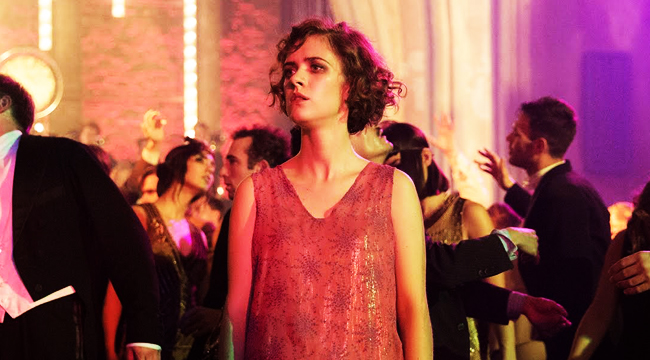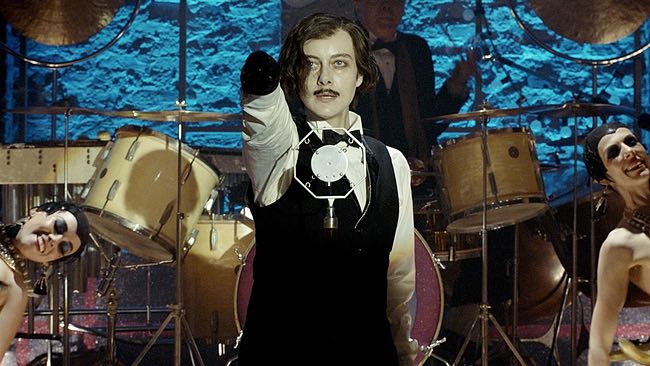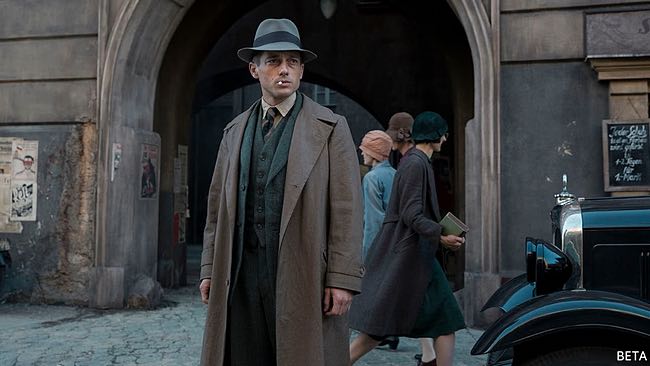
One of the most exciting and/or daunting aspects of the current overloaded TV environment is that we not only have nearly 500 original scripted American shows being made in a year, plus access to most of the best shows made from decades past, we also have access to some of the best shows being currently produced around the world, which are bolstering the lineups of a streaming network near you.
There’s so much of it, coming in so rapidly, that it’s hard to know where to start sometimes. Several readers encouraged me to try Dark, a German sci-fi drama that Netflix recently added, but five episodes of moody atmosphere and occasional bursts of time travel ultimately weren’t enough to make me care about the characters or the solution to the puzzle box storytelling, so I tapped out. Then a friend mentioned on Twitter that he was excited to start watching Babylon Berlin, about which I knew nothing save that it was also German.
Sixteen hours of TV later, I had a new viewing addiction.
Co-created by Tom Tykwer (Sense8, Run Lola Run), the series (which Netflix added to its library a few weeks ago; I’ve seen all the available episodes) begins in 1929 in the midst of the Weimar Republic, the democratic government that led to a brief period of decadence and social progress in between the end of the first world war and the rise of Adolf Hitler. It is, in theory, a mystery, as out-of-towner cop Gereon Rath (Volker Bruch) investigates a series of interlocking crimes — a blackmail vice ring, several massacres, and a Soviet train with illicit cargo — with the help of both corrupt local cop Bruno Wolter (Peter Kurth) and secretary Charlotte Ritter (Liva Lisa Fries). But the mysteries are almost deliberately confounding (I lost track of the number of times I had to pause an episode to try to remember how one branch of the investigation connected with another), there really as a narrative spine on which Tykwer and co-creators Achim von Borries and Hendrik Handloegten can hang a fascinating sociological portrait of this brief, precarious moment in German history, when opportunities for women were more abundant, gay culture was more visible, and a battle for the soul of the nation was being fought between democrats, communists, and the nationalists who would soon put Hitler in power and try to conquer Europe.

Rath is a WWI vet suffering PTSD at a time when such things were expected to be endured with dignified silence. Ritter is a flapper who dreams of becoming Berlin’s first female homicide detective, but in the meantime helps to make ends meet with periodic stints as a sex worker in an underground fetish club.There are German gangsters, Russian revolutionaries plotting to overthrow Stalin and restore Trotsky to power, a shadow German military operation taking place in direct contradiction of the Treaty of Versailles, and a fugitive Russian Countess, Svetlana Sorokina (Severija Janušauskaitė), who has a drag king act at a local club that provides the series’ first great showpiece moment:
It’s with spectacle like that performance, or a May Day protest turned violent, or a shootout atop a moving train, that Babylon Berlin is at its most effective. The production values and visual scope of the series are remarkable, especially compared to a lavish drama set half a world away in the same period like Boardwalk Empire, which feels small and stagebound next to what Tykwer and his fellow directors are able to mount again and again.
But the series also has a keen sense of the smaller moments, when shifting sands in world history can be seen in each characters’ personal history, from the open contempt with which many of Rath’s suspects treat his Jewish boss, August Benda, to the way that Ritter’s eyes are so often bigger than her stomach when it comes to what even this more liberal ’20s society will allow a woman to do.
There are times when the show starts to choke on the sheer tonnage of plot — the business of why it takes so long for anyone to move or look inside the Soviet train is particularly convoluted — and some of the more memorable flourishes of the first half (like Sorokina’s mustache, which she also wears out in public when working as a spy) largely go away in the second. But the season finale (with a few exceptions, which I’ll get to in a moment after a spoiler warning) brings most of the arcs to satisfying conclusions — albeit frequently maddening ones, in that Wire-esque way where the system does not like to bend to the needs of individuals — and the emotional highs are worth the occasional moments that require the viewer to construct a conspiracy board with yarn to figure out how all the different factions fit together.
When trying to play in the international component of Peak TV, you win some, you lose some. For me, Babylon Berlin was a big, big win.
And since it’s been out there for a while, for the benefit of those who have already watched it all, some full season spoilers coming up just as soon as I hop aboard a Paternoster elevator…

Another way in which the show at times resembles The Wire is that its most devastating moments seem to be happening in the penultimate episode: Greta being suckered in by her Nazi boyfriend and his pals to assassinate Benda, and in the process inadvertently murdering his sweet little girl, too; and Charlotte appearing to drown when Wolter runs her and Gereon off the road to prevent them from interfering in the train heist.
The former is some Hitchcockian cruel suspense, as each passing moment increases the likelihood that something will happen to other members of the Benda family, and the revelation that Greta was played by Fritz and company only makes it worse. Killing Charlotte, on the other hand, seems a gross miscalculation, as she’s the more compelling of the two leads (Gereon’s interesting, too, but he’s a more familiar type). Instead, she’s miraculously revived at the start of the finale, which is simultaneously reassuring (she’s still around!) and aggravating (that kind of bogus cliffhanger is beneath this show), and part of the season’s strange trend of giving certain characters (Wolter, Kardakov) so much plot armor that they’re able to survive multiple incidents that would each kill a normal human several times over.
From there, though, the finale goes through so many wild twists and turns that they quickly snuffed out my cries of, “He didn’t get out of the cock-a-doodie car!” From the discovery that the gold bricks are really coal, to Wolter’s omnipresent cigarette being the thing that gets him killed (a moment of such black comic violence, I whooped with laughter until my office neighbor asked me to pipe down), to the revelation that the train itself was the gold, to Gereon figuring out that the evil hypnotist was his presumed-dead brother, the finale was so crazy and inventive and well-executed (that Rath/Wolter shootout in particular) that I stopped questioning any of it and just went along.
What did everybody else think? Did you feel satisfied with where the story went by the end? Did you have a favorite musical number? (Sorokina’s big number is the best, but Gereon and Helga’s fantasy dance was pretty great, too.)
Alan Sepinwall may be reached at sepinwall@uproxx.com. He discusses television weekly on the TV Avalanche podcast. His new book, Breaking Bad 101, is on sale now.
